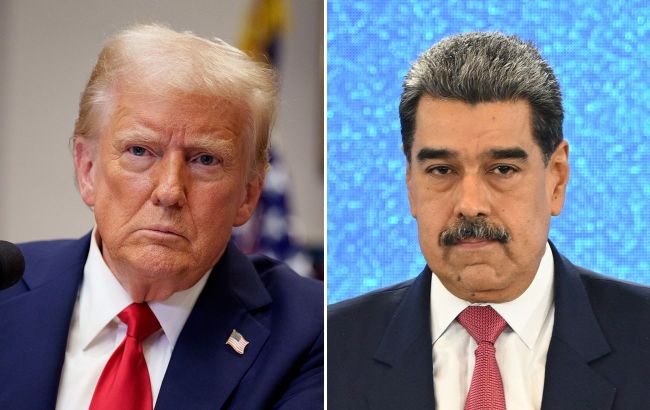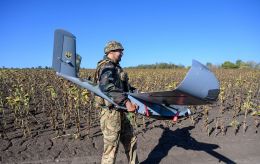Will Trump invade Venezuela? Brazil expert explains what's rattling Latin America
 Donald Trump and Nicolás Maduro (collage: RBC-Ukraine)
Donald Trump and Nicolás Maduro (collage: RBC-Ukraine)
Read about the prospects of a US military invasion of Venezuela, the reasons for Trump's activity in this direction, and how Latin American countries perceive it in a quick interview with Brazilian political commentator Uriã Fancelli.
Key questions
- Why has the US deployed military forces near Venezuela?
- What operations could these forces be capable of?
- How strong is Maduro's position?
- How do Latin American countries view US activity?
The situation around Venezuela is rapidly escalating. Donald Trump's administration has launched a large-scale military operation off the coast of Venezuela called Southern Spear, officially aimed at preventing drug trafficking from that country.
According to US media reports, more than 10% of US regional forces are already concentrated in the region – an unprecedented concentration of military power. The White House has not publicly ruled out various scenarios for further action, ranging from increased economic pressure to possible targeted strikes on military facilities belonging to Nicolás Maduro's regime.
Meanwhile, Venezuela is mobilizing its own forces and demonstrating its readiness to resist. Neighboring countries find themselves in a difficult position. Brazil and Colombia, which have already accepted millions of Venezuelan refugees, are watching the possible escalation with concern, as a new wave of migration would be a real disaster for their economies.
To understand how Latin Americans assess the actions of the US, RBC-Ukraine spoke with Brazilian expert on international relations Uriã Fancelli. In a quick interview, he shared his thoughts on the real motives behind the deployment of US troops and why it is causing concern not only in Venezuela but also in other Latin American countries.
 Uriã Fancelli (photo: Vitalii Nosach/RBC-Ukraine)
Uriã Fancelli (photo: Vitalii Nosach/RBC-Ukraine)
– Trump officially states that the main goal of Operation Southern Spear is to combat illicit drug trafficking. What do you think about this argument?
– Trump uses two main arguments to justify the military presence in the Caribbean. The first one is that he wants to stop the flow of drugs from there, but it doesn't make sense because most of the drugs that enter the United States come either from the Pacific or from Mexico.
The second argument - Trump claims that there are a lot of people coming out of mental health institutions and going to the United States illegally, so he would also like to stop that. But there is no serious data that corroborate what he says.
So what everything points to is that he would like to implement a regime change in Venezuela, and therefore, he's increasing the military presence in that region so he can create dissent in Venezuela. Because Maduro's government is only in power because of the support not only of the army, but also of other military forces like the colectivos (armed pro-government civilian militias - ed).
More than 10 % of the US military power is present in that region now. So by intimidating with military power, Trump aims to destabilize the government and to force dissent so he could maybe replace it with someone who would better suit his own interests.
– Why is this important to Trump? Is it just because of Marco Rubio and his background as a Cuban migrant? Or are there some rational reasons as well? For example, in Ukraine, there’s an opinion that installing a pro-American regime in Venezuela would lower oil prices.
– Of course, there are oil interests. Trump made it very clear when he decided to put his policy of "Drill, baby, drill" to practice. Trump will never do anything that doesn't also involve economic interests. He's very transactional. That's the word that everybody uses to describe him.
He has the Marco Rubio effect. If there's one person who was responsible for trying to convince Trump to have a more harsh approach toward left -wing regimes in the region, that person is Marco Rubio. He's the one who developed this kind of stance. He has a personal trauma of this kind of regime. Rubio is the son of Cuban migrants. He understands that for regime change in Cuba, Cuba also needs to lose the support of other countries. Countries such as Venezuela, for example. But I would also argue that there's something else behind it, which is Trump's approach towards the region as a whole.
When I say that, I mean that he might be trying to revive what was the Monroe Doctrine. It defends basically that in this part of the world, the boss is the US. It's not China. It's not Russia. So the Americas should be under America's umbrella.
There are many examples to corroborate that. The fact that even when Trump decided to threaten to invade Greenland, or when he threatened Canada to make it the 51st state. Or when Trump decided to change the name "Gulf of Mexico" to "Gulf of America". When he decided that it was time to push China away from the Panama Canal. I think it's the same thing with Venezuela.
Something else that also corroborates that idea. For example, he's approaching Argentina, but he's doing it by taking into consideration his ideological similarities to Javier Milei, the president of Argentina.
With Brazil, he was trying to support Jair Bolsonaro, the president who was convicted of trying to stage a coup. When he saw that Bolsonaro was going to jail because he was convicted by the Supreme Court, he changed his approach. So, recently, Brazil is talking to Venezuela again, and even some products now are exempt from tariffs. So, yes, Trump wants to have more influence in the region, and he adopts different approaches depending on who is in power in each country.
– If Maduro is overthrown one way or another, can the opposition actually replace him? I’ve seen estimates that its social base has largely left Venezuela as refugees. Instead, the people who remain in the country are mostly those who support Maduro - the classic populist.
– I think there are two things. The first one is that, of course, there is a candidate, and I wouldn't even say Edmundo González, which was the president that was elected last year, I would say María Corina Machado. From the moment that she wins the Nobel Prize and she dedicates it to Trump on a social media post that she made.
She's basically saying, "I'm your guy, I'm here, so think of me, whatever you do". Which is very strange because someone who wins a Nobel Peace Prize should defend maybe a peaceful transition to democracy, not an external military invasion. So that's why she was also very criticized because of that.
The second thing I would say - as long as Maduro has the support of the military, we can't consider anything. Of course, there's an active diaspora. Brazil has received, for example, more than 600,000 migrants from Venezuela. Colombia was the most affected country, with over 3 million, but the US also received a lot of migrants. I guess it's more than a million Venezuelans or 900,000. So it's also not in Trump's interest to create a new diaspora.
That's why I believe, and he hasn't so far moved so many troops in Venezuela. It's a country of 30 million people. So far, if we look at the military equipment available in the region, everything points that if Trump decides to do some sort of attack, it would be something similar to Iran. Something fast, something aiming at military targets.
– What is the main concern of the neighboring countries in this situation?
– I think, of course, there's the regional instability, new diasporas, because it's not good for any country. Colombia doesn't need millions more of Venezuelans. Brazil also doesn't need it.
But I would say that it brings back historical traumas of external interventions, especially because Trump, when he comes back with these presidential findings that allow for the CIA to do specific operations inside Venezuela, does it remind Brazil of? Brazil, for example, in the 1960s, the CIA was also present when there was a military coup in Brazil.
Same for other countries. So that's the main concern, that having such a strong power as the US meddling in something that would be original or internal issues of other countries, even if it's with a government that is not seen as legitimate by the region.

